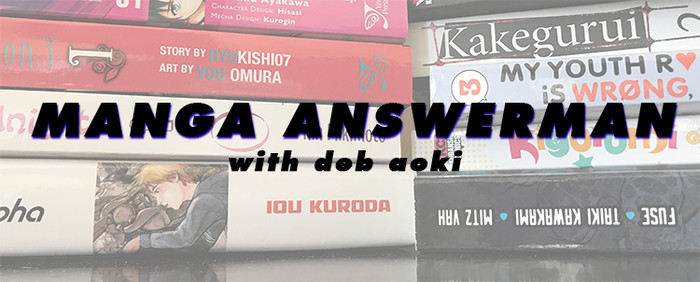Manga Answerman
Why Do So Many Manga Artists Avoid Being Photographed?

Editor's note: Originally published June 2018 - Manga Answerman is taking the week off, but we'll be back next week with a new column.
Q: Why do a lot of manga artists prefer to not have their photos taken at events, like comic or anime conventions or book signings?
This particular question has puzzled and bedeviled me for a while. As a journalist who occasionally interviews manga artists from Japan for publications, I always have to ask if the manga creator I'm talking with is OK with having a photo taken, so I can post a picture of them at the show to accompany the interview. I'd say… 75% of the time, the answer is no – or at least I can't take a photo of their face.
I've gotten around this by shooting photos over their shoulders as they sign or draw during an autograph session, or I've been told to use the drawn self-portrait supplied with the press release. That's fine – I'd be a real jerk to ignore the expressed wishes of a manga creator. But when you compare this to most comics creators from almost every other part of world who have no problem having their photo taken by fans or for publication, this aspect of dealing with manga creators seems a little odd and counter-productive. Why aren't they taking better advantage of the publicity that comes with making an appearance at a comics event?
Why are so many manga creators so camera-shy? Again, there's no one answer to this question that covers all mangaka or situations, but here are some of the responses I've heard when I've asked.
Privacy concerns, regulations and social norms in Japan – Privacy is taken very seriously in Japan. You're not allowed to take photos of people without their express permission, or you run the risk of a lawsuit. Attorney Takashi Ito explains the Japanese perspective on privacy and “portrait rights” (the right to refuse to be photographed) in this interesting overview published in The Japan Times. This is why some photos shot at Japanese comics shows like Comiket have participants' faces blurred or mosaiced to get around this restriction.
Manga-ka like to keep the focus on their manga, not their personal lives – Another reply I've heard is that manga creators prefer to let their work speak for them, rather than any focus on themselves, their personal lives and preferences.
Fear of ridicule on 2-chan or 4-chan discussion boards – I've heard anecdotes of manga creators, especially female manga creators, getting unfairly and mercilessly ripped apart for their looks on social media when their photos have popped up online.
Wanting to keep the mystique / fantasy alive for readers – One reply I've heard was from a shojo manga creator, who said that she wanted to remain relatable to her young teen readers, and that she couldn't do that if they saw her as an older woman.
Wanting to keep their manga life separate from their personal life – This can be as simple as wanting to live a quiet, normal life and not being bugged (or stalked!) by fans. In other cases, they may not want their family or friends know that they're manga creators, especially if they write/draw explicit or adult content. This is also related to why many manga creators use pseudonyms or pen names.
Of course, not all manga creators are against having their photos taken. Some creators are like celebrities in Japan and abroad, and are more comfortable in front of a camera. Examples of photo-friendly mangaka include Leiji Matsumoto (Captain Harlock), Takehiko Inoue (Slam Dunk), and Moto Hagio (Otherworld Barbara). Most recently, Asano Inio, creator of Goodnight Punpun was perfectly fine with having his photo taken by fans during his recent visit to Toronto Comic Arts Festival 2018. Others, like Hiro Mashima (Fairy Tail) were photo-adverse and wore sunglasses on their first visits to an overseas comics show, but in subsequent visits seemed much more comfortable with having their photos shot by fans.
The main thing is to ask first, and respect their wishes if a manga creator says “no photos.”
Do YOU have a question for the Answerman?
We want your questions! Send in as many or as often as you like. We can only pick three questions a week (and unfortunately I don't have ALL the answers) so if you haven't been chosen, don't be discouraged, and keep on sending.
However, READ THIS FIRST:
- CHECK THE ARCHIVES FIRST. I've answered a lot of questions already!
- If you want to be a voice actor, READ THIS.
- I can't tell you if or when a show will get another season. New productions are closely guarded secrets until they're publicly announced, so there's nothing I can tell you that Google can't.
- I cannot help you get in touch with any producers, artists, creators, actors or licensors. If you're trying to pitch an idea, you should read this.
- I usually won't bother with questions asking if something is a trend. Maybe? It's impossible to know until it becomes obvious.
- I take questions by email only. (Tweeted questions get ignored!)
- I will not do your homework/research/report for you.
- Keep it short -- like, a paragraph at most, and use proper grammar or punctuation.
Got all that? Great! The e-mail address is [email protected] (answerman at animenewsnetwork.com). And thanks!!
Deb Aoki was the founding editor for About.com Manga, and now writes about manga for Anime News Network and Publishers Weekly. She is also a comics creator/illustrator, and has been a life-long reader of manga (even before it was readily available in English). You can follow her on Twitter at @debaoki.
discuss this in the forum (43 posts) |
this article has been modified since it was originally posted; see change history